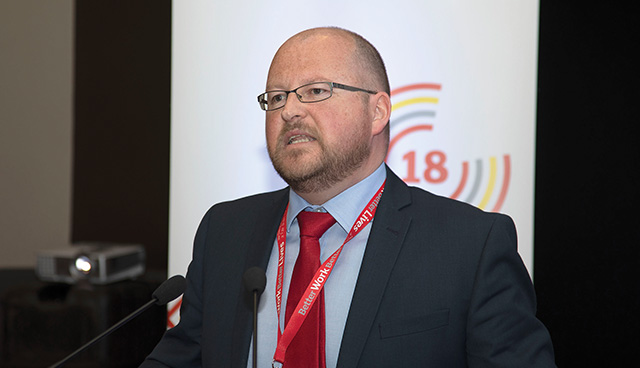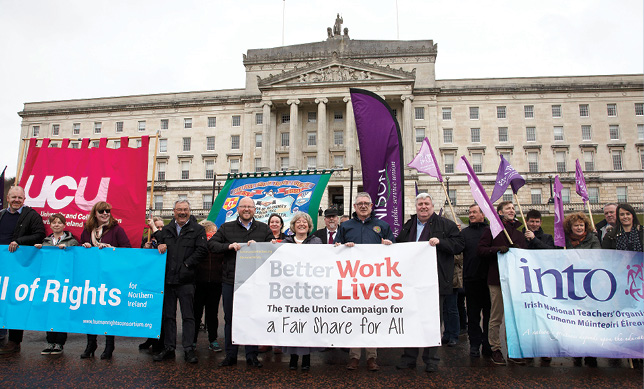Better work better lives


The Northern Ireland Committee of the Irish Congress of Trade Unions (NIC-ICTU) hosted its Biennial Delegate Conference (BDC) in Derry on 11 and 12 April. The policy setting conference was attended by 250 delegates from the 24 trade unions and 10 Trades Councils affiliated to the ICTU in Northern Ireland, writes John O’Farrell.
The conference debated 38 motions covering a comprehensive agenda of issues relevant to all workers and their families in Northern Ireland. The conference had as a common thread its Better Work Better Lives campaign which promotes decent work, fair pay and real investment for all workers across Northern Ireland.
The conference was addressed by senior trade union figures, such as Patricia King, General Secretary of the ICTU, who told the conference that: “This movement supports the return of devolved power to the Northern Ireland Assembly and Executive. We campaigned for that during the last period of suspension, which ended with the St Andrew’s Agreement a dozen years ago, on the grounds that the interest of working people were better served by locally accountable politicians.
“Democracy, accountability, human rights protections, pledges of equality, devolved powers over the economy, the health services, the education system and employment laws – those were the values we championed and the potential in the Agreement which we supported. We want to see that spirit of ‘98 regained and we want to see the Agreement implemented and completed.”
King was speaking the day after the unions hosted a photo-op at Stormont to mark the role played by civil society in the formation and development (and protection) of the peace process.
“One of the messages we will be delivering today to our political class comes from our experience as negotiators,” said ICTU Assistant General Secretary Owen Reidy. “No matter how painful, it is not a bad thing to compromise sometimes, and to earn the trust of your adversaries, for the long-term betterment of everybody concerned.”

“Our movement, as the largest cross community representative body in Northern Ireland has a right and indeed an obligation to influence public policy in the interest of workers.”
Speaking the following day at the conference, Reidy said the unions should celebrate their successes, such as the UCU members who went on strike to protect their pensions and the Bombardier shop stewards from UNITE and GMB “who faced a daunting task in challenging the crazy prospect of facing a 300 per cent tariff on their work”. “They took their campaign across Northern Ireland, the UK and internationally. They argued with reason, they stood up for their workforce and they won,” he said.
The conference, which sets common policy goals for Northern Ireland’s trade union movement for the next two years, discussed and voted upon motions on topics including:
• Brexit;
• the political impasse at Stormont;
• defending the Belfast/Good Friday Agreement;
• harassment in the workplace and other equality matters;
• developing an industrial strategy;
• celebrating the NHS on its 70th anniversary;
• gaining real terms pay rises for working families; and
• the policy priorities of the Better Work Better Lives Campaign.
Reidy made an important call for a new initiative to re-engage more people: “The trade union movement is unified in its determination to achieve decent wages for quality jobs, promote real investment in public services and gain support for these objectives through a forum on Social Dialogue. Such a collaborative approach is common and successful across most European countries, and has been an effective part of devolved governance in Wales – there is no reason why it could not be a useful means of developing policy in Northern Ireland, regardless of whether Stormont is functioning as fully as we would all like to see.
“We know that a forum for Social Dialogue is not a panacea to all our ills and we would be naïve to think so. It is also not an end in itself, it is a vehicle, a means to an end. We have always been advocates for power sharing in this society and we want it restored. But if it is to be restored it must be vertical as well as horizontal. Our movement, as the largest cross community representative body in Northern Ireland has a right and indeed an obligation to influence public policy in the interest of workers.”





